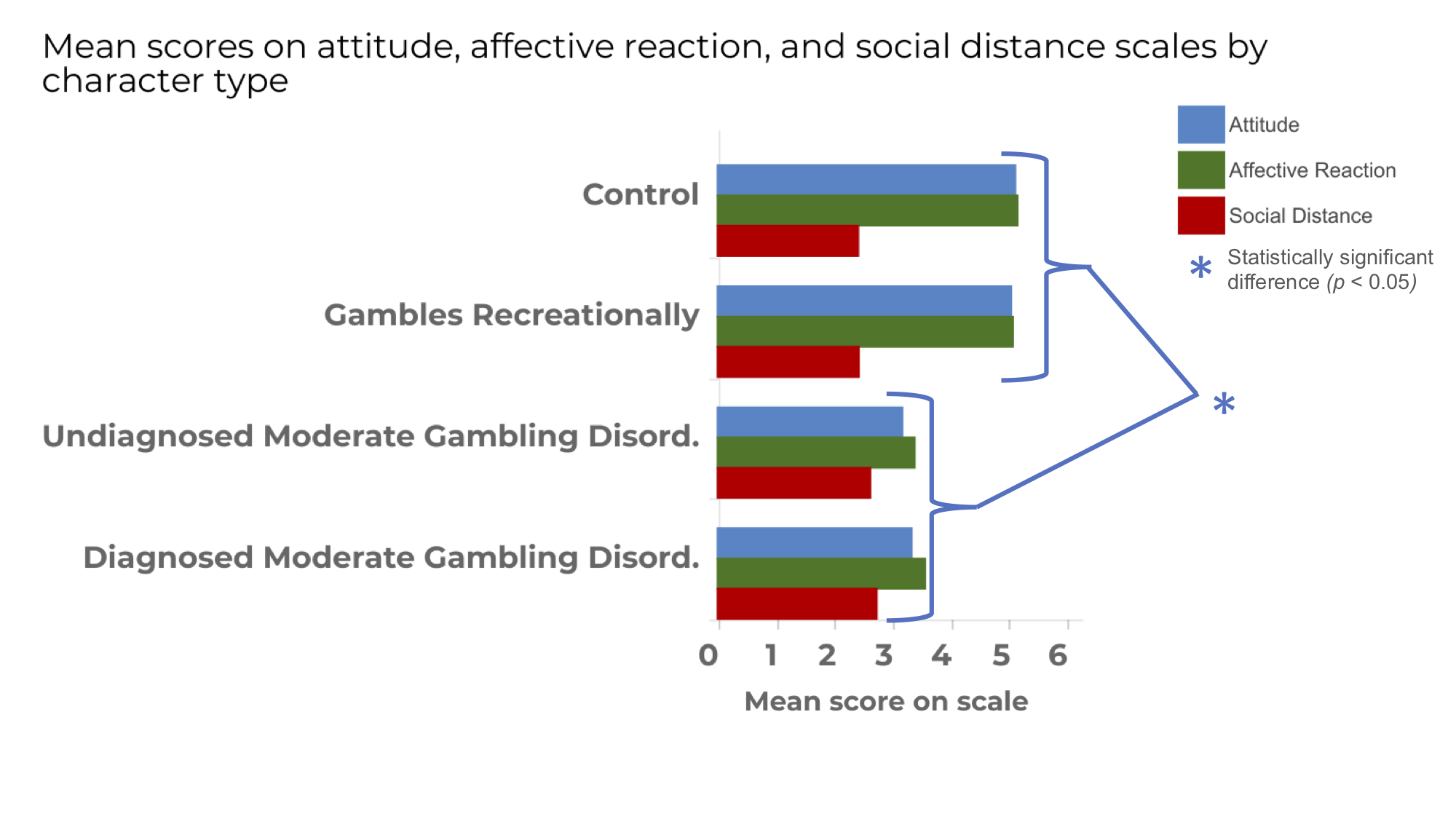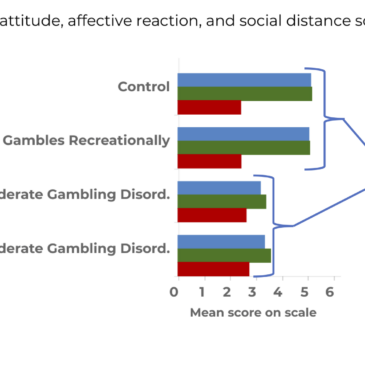Did you know that experiencing stigma can prevent people from seeking professional treatment for a mental health condition? For people with a gambling disorder or other addictive disorder, a lack of professional help can result in a worsening of problem behaviors and future negative consequences. Decreasing stigma can encourage people to successfully seek and complete treatment. This week, as part of our Special Series on Stigma and Addiction, The WAGER reviews a study by Billy Palmer and colleagues on the stigmatization of people with a gambling disorder.
What was the research question?
To what extent do people stigmatize those who are experiencing gambling problems? Does being diagnosed with a gambling disorder increase stigma?
What did the researchers do?
The researchers surveyed 378 U.S. adults using the Amazon Mechanical Turk online survey platform. The survey randomly assigned respondents to read one of four descriptions of a target named Steve. In the four descriptions, Steve varied in terms of his gambling involvement: (1) he was a tennis player who did not gamble (a control condition), (2) he gambled but kept within his limits (i.e., a recreational gambler) (3) he gambled and showed signs of a moderate gambling disorder,1 and (4) he gambled exactly as in the third description, but additionally was diagnosed with a moderate gambling disorder by a psychologist. They survey asked respondents how they would feel interacting with someone like Steve (i.e., their affective reaction), how they would describe him on characteristics like good/bad (i.e., their attitudes), and if they would choose to interact with Steve (i.e., social distance/discrimination). The authors compared how people in the four different conditions answered these questions using ANOVA tests.
What did they find?
Respondents viewed Steve with a more negative attitude, less positive affect, and more discriminatory feelings when he showed signs of moderate gambling disorder, compared with the control and recreational gambler descriptions (see Figure). They did not stigmatize Steve more when his condition was diagnosed as compared to not diagnosed. However, compared to the control and recreational gambler descriptions, respondents only wanted more social distance from Steve when his gambling disorder was diagnosed.

Figure. Mean scores on attitude, affective reaction, and social distance scales by character type. Click image to enlarge.
Notes: Attitude and affective reaction items were rated on a 7-point scale with higher numbers representing more positive views. Social distance items were rated on a 4-point scale with higher numbers indicating more social distance desired.
Why do these findings matter?
These findings are important because they show that the public holds considerable stigma towards people with gambling disorders, whether or not they have been diagnosed by a professional. Stigma toward problem gambling can reduce the chance that people will seek help, including professional treatment. As Michael Botticelli discussed in this month’s op-ed, by emphasizing the importance of reducing stigma, family and friends of those suffering with addiction can provide better social support and ensure that their loved ones receive necessary medical care.
Every study has limitations. What are the limitations in this study?
Although the authors collected a sample that had similar gender, racial and ethnic compositions to the United States adult population, it is possible that the results have limited external validity in the real world due to non-response bias in survey research.
For more information:
Do you think you or someone you know has a gambling problem? Visit the National Council on Problem Gambling for screening tools and resources. For additional resources, including gambling and self-help tools, please feel free to visit The BASIS Addiction Resources page.
— Eric R. Louderback, Ph.D.
What do you think? Please use the comment link below to provide feedback on this article.
________________
1. Signs of a gambling disorder in the character description included feeling restless when cutting back on gambling, gambling more and more to feel the same excitement, and persistently thinking about gambling.





Silvia May 21, 2019
I usually tell my patients and their families that compulsive behavior in relation to gambling is a problem. However, they are much more than compulsive gamblers, as they usually call themselves, as well as the context. Which leaves them rigidly under the label of diagnosis. The game in excess, is an aspect of his personality and has treatment. They also have different roles in life and many positive aspects for which to consider themselves valuable people.
A noticeable relief is observed when they manage to run from the diagnosis, accept their problem and, at the same time, recognize their competences and positive characteristics in other aspects of their lives.
Greetings.
I usually tell my patients and their families that compulsive behavior in relation to gambling is a problem. However, they are much more than compulsive gamblers, as they usually call themselves, as well as the context. Which leaves them rigidly under the label of diagnosis. The game in excess, is an aspect of his personality and has treatment. They also have different roles in life and many positive aspects for which to consider themselves valuable people.
A noticeable relief is observed when they manage to run from the diagnosis, accept their problem and at the same time, recognize their competences and positive characteristics in other aspects of their lives.
Regards.
Don Feeney May 21, 2019
It would have been both interesting and useful to add one more scenario: Steve had been diagnosed as having a moderate gambling disorder, received treatment, and is now in recovery.